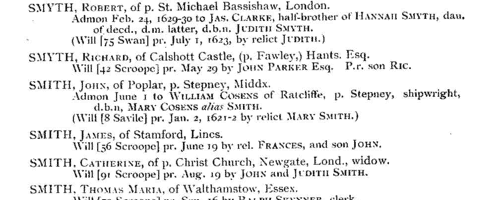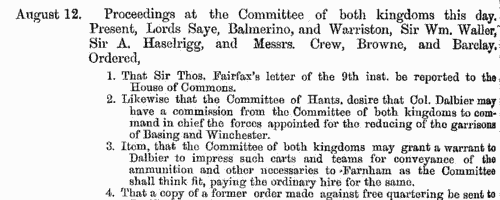Mill Surname Ancestry ResultsOur indexes 1000-1999 include entries for the spelling 'mill'. In the period you have requested, we have the following 424 records (displaying 21 to 30): Single Surname Subscription | | | Buying all 424 results of this search individually would cost £2,376.00. But you can have free access to all 424 records for a year, to view, to save and print, for £100. Save £2,276.00. More... |
These sample scans are from the original record. You will get scans of the full pages or articles where the surname you searched for has been found. Your web browser may prevent the sample windows from opening; in this case please change your browser settings to allow pop-up windows from this site. Official Papers
(1603-1610)
The State Papers Domestic cover all manner of business relating to England, Scotland, Ireland and the colonies, conducted in the office of the Secretary of State as well as other miscellaneous records.
MILL. Cost: £4.00.  | Sample scan, click to enlarge

| Scottish litigants, rebels and cautioners
(1610-1613)
The Privy Council of Scotland exercised a superior judicial authority in the kingdom, and consequently received and dealt with a constant stream of petitions, as well as dealing with the internal security of the state. This register of the council from July 1610 to February 1613, in the reign of king James VI, was edited by David Masson and published under the direction of the Deputy Clerk Register of Scotland in 1889. The publication starts with the Acta and Decreta, a chronological consolidation of material from Acta Secreti Concilii proper, the Decreta, the Book of Commissions, the Book of Sederunts, the Minute Book of Processes, and The Book of the Isles. There is then a section of Royal and Other Letters (pp. 565-644); then acts and bands (bonds) of caution (surety) from the registers called Acta Cautionis (pp. 647-690); and Miscellaneous Privy Council Papers (693-746). Many of the individuals mentioned are the complainants, those of whom they complained, and the sureties on both sides: at this period, many of the complainants are alleging serious attacks, often of a feuding nature. Many of the bonds entered into by the cautioners are promises to keep the peace towards such enemies. Failure to answer to the council when summoned was a serious contempt, leading to being denounced a rebel, with serious consequences.
MILL. Cost: £4.00.  | Sample scan, click to enlarge

| Official Papers
(1623)
The State Papers Domestic cover all manner of business relating to Britain, Ireland and the colonies, conducted in the office of the Secretary of State as well as other miscellaneous records. Includes some material from previous years, as early as 1603.
MILL. Cost: £4.00.  | Sample scan, click to enlarge

| Merchants and traders in Aberdeen
(1399-1631)
A. M. Munro searched the council registers of the royal burgh of Aberdeen, and compiled this list of burgesses admited to the borough. The entries prior to 1591 were contained in lists engrossed in the council registers at the close of the minutes for the year ending at Michaelmas, but after that date in addition to the annual lists, which are continued, there is almost always a separate minute of admission under the respective dates. The records before 1591 are not only sparser, often with no more than a name, but are also lacking for 1401-1405, 1413-1432, 1434-1435, 1518-1519, 1557 and 1562-1564 - other blanks were filled in from the guildry accounts where such existed. Guild burgesses were allowed unfettered trading rights in Aberdeen; simple burgesses could only deal in Scottish wares (so being barred from the lucrative English and Flemish imports and exports); trade burgesses were limited to their own particular trades; and the council was able ex gratia to create honourary burgesses, who were accorded the full privileges of burgesses of guild and trade, and among whom numbered members of almost every family of note in Aberdeenshire. Burgesses could thus be created by descent, by apprenticeship into a trade, or ex gratia, and in the later portions of this roll the precise circumstances are usually given, sometimes also with the name of a cautioner or surety. Burgesses, masters and cautioners are all indexed here.MILL. Cost: £4.00.  | Sample scan, click to enlarge

| PCC Probates and Administrations
(1633)
The Prerogative Court of Canterbury's main jurisdiction was central and southern England and Wales, as well as over sailors &c dying abroad: these brief abstracts, compiled under the title "Year Books of Probates", and printed in 1902, usually give address, date of probate and name of executor or administrator. They are based on the Probate Act Books, cross-checked with the original wills, from which additional details are, occasionally, added. The original spelling of surnames was retained, but christian and place names have been modernised where necessary.MILL. Cost: £2.00.  | Sample scan, click to enlarge

| PCC Probate Abstracts
(1630-1634)
The Prerogative Court of Canterbury's main jurisdiction was central and southern England and Wales, as well as over sailors &c dying abroad: these brief abstracts usually give address, date of probate and name of executor or administrator
MILL. Cost: £2.00.  | Sample scan, click to enlarge

| Lancashire and Cheshire Marriage Licences
(1639-1644)
Licences for intended marriages in Chester archdeaconry, which covered Cheshire and Lancashire south of the Ribble (by far the most populous part of that county)MILL. Cost: £4.00.  | Sample scan, click to enlarge

| Official Papers
(1645-1647)
The State Papers Domestic are the main series of records of internal British administration for this period. The volumes printed in abstract here (Charles I dx to dxv) run from July 1645 to December 1647, a period of defeat of royal power by the parliamentary forces. Parliament's victory at Naseby in June 1645 led to the collapse of the Royalist cause and the imprisonment of the king in Carisbrooke Castle towards the close of 1647. During all these events the administration of government continued, largely using the same institutions, leaving similar series of records as before: but executive power is now represented in these books by the Committee of Both Kingdoms (England and Scotland). The State Papers Domestic for these years are largely concerned with the prosecution of hostilities, the movements and supply of troops, and the treatment of 'delinquents'. Chronologically interleaved with the abstracts of the main volumes are details from the series of Proceedings of the Committee of Both Kingdoms, but these are lost for the years 1646 to 1647, brief notes only surviving in the Indexes to the Day Book of Orders. There are also appendices relating to the victualling and disposition of the Navy, taken from the Letters and Papers of the Committee for the Admiralty and the Committe of the Navy, which also include some petitions from sailors, victuallers, officials, or their dependants, seeking redress or relief.MILL. Cost: £4.00.  | Sample scan, click to enlarge

| Besiegers of Colchester
(1648)
The siege of Colchester was one of the most severe of the Civil War, and lasted from 14 June to 28 August 1648. Kent and Essex Royalists on their way into Norfolk and Suffolk turned aside into Colchester, hoping to get recruits there. Fairfax pursued from his headquarters in London, and when on 12 June he appeared with 5,000 men they were obliged to make hasty preparations for defence. The town was ill-fitted to stand a siege, and the 4,000 Royalist troops were most of them newly levied and ill-armed, but after a repulse on 14 June 14, Fairfax realized that a long siege was inevitable, and busied himself with raising forts to completely isolate the town. On 2 July the work of circumvallation was finished, and though meeting with fierce resistance, Fairfax gained post after post. Early in August famine added to the misery of the besieged, and the citizens began to clamour for surrender. On 19 August, Norwich, the Royalist leader, asked for terms; negotiations went on for some days, and finally on 28 August, Fairfax occupied the town. Three of the Royalist leaders were shot, and the soldiers were sent to labour in the West Indies, or to enforced military service under the Venetian Republic. The townsmen were made to pay a heavy fine.
These accounts list disbursements to workmen digging the fortifications and to artificers, soldiers and officers involved in the siege. The total sum paid was about £1,695.
MILL. Cost: £4.00.  | Sample scan, click to enlarge

| Official Papers
(1648)
The State Papers Domestic cover all manner of business relating to Britain, Ireland and the colonies, conducted in the Committee of Both Houses held at Derby House, as well as other miscellaneous records. These records are from January 1648 to January 1649.
MILL. Cost: £4.00.  | Sample scan, click to enlarge

|
Research your ancestry, family history, genealogy and one-name study by direct access to original records and archives indexed by surname.
|












